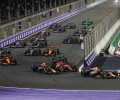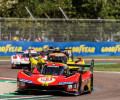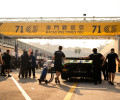2013 Singapore Grand Prix - Friday Press Conference

TEAM REPRESENTATIVES – Franz TOST (Toro Rosso), Bob FEARNLEY (Force India), Tony FERNANDES (Caterham), Claire WILLIAMS (Williams), Eric BOULLIER (Lotus)
PRESS CONFERENCE
Let’s start with today’s two practice sessions. Bob, if I could turn to you first. Progress made or was it a bit of a struggle for the team?
Bob FEARNLEY: It was a little bit of a struggle but I think we saw a little bit of progress in FP2, so optimistic.
Same optimism for you Franz?
Franz TOST: Yes, if we find seven to eight tenths then I’m optimistic for tomorrow.
Any chance?
FT: I hope so. The engineers have some time now. It’s a wonderful night and I’m convinced that they can study all the data and they will find a solution for tomorrow’s set-up.
For yourself, Eric, one of your drivers spent more time on the track than the other. Romain Grosjean had problems.
Eric BOULLIER: Yeah, it’s a concern in these early days but it should be fixed for tomorrow. Some issues yes on Romain Grosjean’s steering, power steering and hydraulics but still fast, and obviously happy with the second session when we could see on the high fuel pace Kimi was matching the so fast Red Bull cars, so we’ll see tomorrow,
At Williams, Valtteri Bottas, driving here for the first time, was slightly faster than his team-mate Pastor Maldonado.
Claire WILLIAMS: He was but I think we’re still where we are and I don’t think that was a surprise. We had a few changes to the car this weekend that we have evaluated so we have a lot of data to go through and we’ll see where we are tomorrow.
And Tony and Caterham?
Tony FERNANDES: As Claire said: we are where we are. Young drivers who get used to the track every practice session and we improve every session, so we’re expecting a bit more out of FP3 but we are where we are.
Eric, if I could turn to you next. Not for the first time in Formula One history we’ve seen drivers and engineers leave Enstone recently to head off to Ferrari. How concerned are you about the impact the departures of Kimi Raikkonen, James Allison and Dirk de Beer will have on Lotus regarding your future competitiveness.
EB: Not so high as you could maybe surprisingly imagine. It’s true that it’s a new chapter for Enstone, we lose valuable people and obviously a very charismatic driver. But as you said it happened twice already in the Enstone and every time the team has been world champion right after. So actually I’m quite motivated saying let’s start a new chapter and do as well or as good as happened before.
Claire, you’ve strengthened your staff at Williams. Pat Symonds, just over a month ago, started as Chief Technical Officer. Have you started to notice differences yet? What areas has Pat identified that you need to make improvements in. And also, will you be looking to bring others in in the future?
CW: I think Pat started just before Spa, so he hasn’t been with the team for a huge amount of time, but already we’re seeing the impact he’s having. He’s a guy that’s worked in Formula One for a huge amount of time and he has a huge amount of experience. He’s won numerous world championships and of course that’s going to bring with it a level of experience we really need at Williams. So he’s definitely looking… or spending a lot of time at Grove. He’s not here with us this weekend, he’s got critical meetings to attend to back at the factory, making sure we are where we want to be next season. But we all know that he’s not the magic bullet but he’s doing a great job for us so far and we will take his advice and see what we need to do once he’s had time to evaluate the business as a whole.
Franz, at the end of the season you and Toro Rosso say goodbye to Daniel Ricciardo, his replacement expected to be another Red Bull young development driver. As team principal, what are you looking for from whoever gets that seat. What qualities do you think a young driver to bring to be an asset to Toro Rosso.
FT: The best one is always when he finds the right-hand pedal and pushes it – that’s quite good. Generally speaking he has to be skilled; he has to have talent. For example, currently the Red Bull drivers, all the drivers from the Red Bull driver pool, have won a championship when they were racing in a lower class. Vettel, for example, in BMW junior. Daniel Ricciardo as well as [Daniil] Kvyat and [Carlos] Sainz won in the Renault 2.0 litre championship. Jean-Eric Vergne won the English championship as far as I know, with the highest number of victories. That means this is a good basis where they showed their talent. This is the first point. The second point: they must be patient. That means if a driver is coming to Toro Rosso he has to live Formula One 365 days a year. There should be nothing around that disturbs him and he has to be 100% concentrated on this job. The next important point is discipline. Discipline does not only mean he arrives in time for the meetings, discipline means also that he, for example, in qualifying does not overdrive the car; that he respects the schedule for his physical training; that he respects all the important facts of nutrition and that he respects what the engineers tell him. The next important point is innovation. He should think first how he can beat, at first his team-mate and for second all the other competitors. That he must think in advance; that he must be well prepared. All these factors together decide together whether a driver becomes successful and wins races and championships or not, and we are looking for this.
On a similar note to Franz, if I could turn to you Tony, is that the same at Caterham? Are they the qualities you’re looking at or do you have to look more at the budget that a driver can bring as well given the situation that the Caterham team is in?
TF: I think this year was the first year that we took the budget into consideration. We were trying to save as much for 2014. This is the state of Formula One right now where unfortunately sometimes the budget plays a large part in your decision making. We’ve got two fairy inexperienced drivers driving for us in the hope that we can put more resource into the 2014 car.
Q: Bob, we were talking to Adrian Sutil here yesterday. It was his opinion the recent dip in Force India’s form was related to the change in the construction of the tyres that we saw halfway through the season. Is that a view you share? And if so, what as a team can you do to combat the downturn in results before the end of the season?
BF: I think Adrian’s absolutely right: it’s not coincidental that the dip in form obviously ties in with the change in tyres. It’s very difficult because we’re past the time in the season where we’ve already committed through to the 2014 car. We ideally would need to put the 2013 car back into the system. I think what we’ve got to do – and it might not be very exciting – but I think we’ve got to just eke the best of the performance we can out of it, we’ve got a great team of engineers and I feel sure that they will overcome the problem but we’ve got to do it on the track and we’ve only got Fridays to do that. So it’s challenging and it’s going to be a little bit tough and it’s disappointing after what was an incredible start to the season – but we are where we are and we can’t change things.
Q: Question to you all next regarding costs in Formula One. We heard from Christian Horner in the FIA press conference in Monza, his thoughts that although teams have been working to reduce costs, 2014 looks like being a very, very expensive year with the regulation changes. In his words, “collectively,” he said, “the mistake the teams made was not saying ‘no’ to the new engines.” I just wonder, do you share his view? Have costs escalated beyond what’s ideally realistic for your teams to deal with the larger outfits on the grid? Start with you Tony.
TF: I’ve been consistent since day one I’ve been in Formula One that costs are too high and every… when I came into Formula One, people talked to me about costs coming down but I don’t think there’s been a single year it’s come down. I think next year will be probably the highest year – so I think there’s something fundamentally wrong. I don’t think it’s just the engine, by the way, I think the teams lost out an opportunity to get costs under control. I think self-interest overrode the sport and we are as much to blame for this problem as an engine.
Franz, is that a fair assessment?
FT: Yes, as I said, next year’s power unit package costs are double the price of this years and we are always talking of reducing the costs. Regarding now that power unit, on the one hand we must say Formula One is the peak of motorsport and we should come with new innovations. I think the new package from another point of view is quite economical and is quite interesting – but it costs us a huge amount of money. But the teams are stupid enough to decide to do tests during the season. This is totally a waste of money because we have eight test days and as soon as the car goes out on the track it costs money. But the teams want to do it. On the one hand they’re complaining they don’t have money, on the other hand, they throw it through the window. It’s a little bit difficult to understand for me but we were voted down because we were against the tests. And who wants the tests? The rich teams. As usual.
I’d be interested in your thoughts now Eric.
EB: It’s true that Formula One is costing too much money and regarding the next year engine, I do agree with Franz, F1 needs technology, this is the pinnacle of motorsport. I think just rather than blaming engine or not, it’s more about the process, about how this technology has been developed and sold to the team, which should have been controlled more. F1 needs technology, we need car manufacturers, we need obviously sponsors but we cannot afford to spend more and more every year. I was not there personally but last decade car manufacturers were in this place and the lowest budget in F1 was around $250m and the highest about $400m. Today it’s not the case any more and the smallest budget is around $60m and the highest is around $250m. But still, it’s… you multiply by four. If you want to be competitive you need to spend unfortunately some money, because you cannot afford if not, and you cannot be competitive then… This is a circle: you are not attractive, you do not bring in any new sponsors… so where is the balance? I think it’s a complicated debate. Obviously all the teams should stick together first, which is obviously something very difficult to do, and also sit down with Bernie and the FIA and make sure the regulations are stable at least for the next few years. I think in the new strategy committee we have a chance to voice what we would like to do. That’s going to be the first step, to make sure we go to a sustainable Formula One.
Claire, to you next.
CW: I don’t think I really have much more to add. Everyone’s covered the arguments. Williams, you know, we’re an independent team and we rely on sponsorships to go racing so the escalation in costs for next year across various different elements of what is involved in going racing, aren’t great for us and we have to just push and push to try to get the budget in for next year. But we have high ambitions as to where we want to position the team and to get the team back up the grid – but to do that is going to take more money. So to have more costs piled on top of each other, it’s going to be a challenge for us.
Bob, where do Force India stand on the current debate?
BF: I think the teams have demonstrated that they are not capable of being able to agree a cost control, so I think the answer is to take it outside of the team’s control. I think it’s up to the FIA to decide a formula, bring that in and implement it.
QUESTIONS FROM THE FLOOR
Q: (Chris Lyons – AP) Eric, Kimi said yesterday that one of the reasons he left was that he wasn’t being paid his salary. Can you clarify the details of that and does the fact that this has come out damage the brand of the team?
EB: I don’t think it’s damaging the brand of the team to be honest. The truth is that yes, we owe him money so that’s true. He’s going to be paid, that’s true too and if you want to have a little bit more of the story, last year in the same period it was the same story: we were owing him some money but at the end of the year he was fully paid. It’s just the way we manage our cash flow. Unfortunately we are not as rich as some other teams on the grid. You can also understand that a team capable of winning this year and fighting for some podiums may not be as sustainable as it should be. We have obviously favoured our people working in Enstone which is understandable I think, obviously the car development because this is the essence of Formula One if you want to keep competing. So there is nothing else behind this story.
Q: (Joe Saward – Grand Prix Special) Just to lighten it up a bit, in two or words or in the case of Franz, three, can you say who’s going to be driving for you next year or who do you think will be driving for you next year? Tony?
TF: No idea.
CW: I have two: no comment.
EB: No.
FT: We will see. The season’s not finished yet. There are some races to go and then Red Bull will sit together and then we will decide.
BF: It’s Vijay’s decision.
Q: If I could re-phrase the question, do you all have in your own mind an idea of who you would like to be driving for you, or is your mind still wide open as to what your final pairing would be?
TF: I would have one pretty clear and one open.
CW: Yes, in one word.
EB: Yes.
FT: Of course the Red Bull drivers - da Costa, Sainz and Kvyat – and then we will see where we end up.
BF: No, ours is a process, we can’t make those decisions at this point. It’s something we do after the Indian Grand Prix.
Q: (Mat Coch – pitpass.com) Eric, with Kimi leaving and the state of the team at the moment, are you after a driver to come in on a salary or are you looking for someone to bring funding?
EB: We keep the same strategy that we’ve had for many months. Geni helped us to bring the team to where it is today. We now want to have more finance, more sponsors because we need to step up and guarantee some stability over a few years. That’s part of the strategy, this is what we are still working on and we need to deliver on that point. We see the timing was not the right one for Kimi but we still have to deliver this. That would then allow us to chose drivers on merit which is obviously the first choice.
Q: (Kate Walker – GP Week) Claire, you mentioned earlier about the difficulties of ensuring that you have enough budget, the way that it’s an annual process. We’ve been reading in the papers recently about troubles with the Venezuelan economy. I was wondering if that was going to have an impact on your operating budget next year.
CW: We have a long term relationship with our friends in Venezuela so no, I don’t really have a concern about that at the moment.
Q: (Dieter Rencken – The Citizen) Lady and gentlemen, you’re constantly going on about cost-cutting in Formula One, how costs must be reduced but as any housewife knows, there are two ways of keeping the household going: one is to reduce costs and the other one is to maximise income. Claire, you said earlier on that your source of income is sponsorship but I would have thought that the commercial rights holder also pays you something, and the commercial rights holder is obviously recording record profits. Is it not easier for the teams to club together to go and get more money out of the commercial rights holder than it is to constantly bang on about reducing costs and not reach agreement?
TF: I think the team didn’t get together. The teams had a wonderful opportunity to try and create a fair, equitable split so that the sport is sustainable. I’m obviously in another sport where I think the difference between the top and the bottom is not as great as between the top and the bottom in Formula One. If you look at the Premier League, the winner of the Premier League share of prize versus the team at the bottom is not as spread out. I think teams had an opportunity but I go back to my very first point: that teams looked at things on an individual basis as opposed to working together in FOTA and trying to find a win-win situation for everyone and create a very healthy environment in a sustainable sport. We screwed it up, it’s as simple as that.
BF: I tend to agree with Tony. I think we’ve had wonderful opportunities and we’ve collectively failed to be able to bring the deals together. There’s a certain amount of greed comes in from the top teams as well and I think they have to take some of the responsibility for that but it is Formula One, it’s not something that’s new, there’s never been any equality in Formula One so you have to go out there and make sure it happens for yourself.
FT: Each team has got the Concorde Agreement, at least from a financial side and if teams do not accept it, they don’t need to sign it. It’s as easy as that. And if they sign it, they have to accept it. There’s nothing to complain of from this side. I think first of all the teams should try to come down with the costs. It’s easy to say yes, we should get more money but give the engineers one million and they ask for two. Give them four million and they ask for eight million. It’s something about the discipline within the teams and as I mentioned before, we decide by ourselves to spend the money for nothing as I explain with the testing. If the teams get more money, they go testing even more and in my opinion that’s wrong.
CW: I think everyone’s said it all really. In my experience, this is the way Formula One has always been so unless you have a seismic change in the future, then I imagine it will remain this way but as people have said, the teams may have had an opportunity but unfortunately they didn’t take it.
EB: Well, I think it’s been debated and it’s true that I share the view of the other team principals that we may have missed an opportunity to just sit down with the commercial rights holder and re-negotiate something which could have been more in favour of the teams but we failed. I think on top of this it’s not one more or less costs, I think it should be both of them to be honest, because, as Franz said, the more money you get, the more money we will spend if you don’t have any safeguards around you. Your engineers will always try to find out the best way to be competitive and this is why we are paying them to be like this, but at the same time, the more open the regulations are, the more we will spend money and waste money. So it’s true that we need both.
Q: (Joe Saward – Grand Prix Special) On the question of testing, can anyone of you think of a good argument this time next year when Bernie says ‘look, you’ve gone to four tests, you haven’t earned any money, why don’t we have four more races in 2015?’
EB: Four is not enough. Ten more is better.
Q: Could you race more, is that possible?
FT: This is what I always request. I prefer to have more races where we gain money instead of spending money for nothing, therefore I would prefer to maybe have two races more or three or four races more – I don’t care – instead of going testing for eight days where we go out to do some laps for nothing in the end, because reliability – as we can see – is no longer an issue. Ten, 15, 20 years ago we could say OK, we need to do some tests so that the cars become more reliable. That’s no longer the case. What we are doing now is to create a new test team, because the theory that the race team will do the tests on Tuesday and Wednesday is absolutely wrong because they have to go home to prepare the cars for the next race. That means that on Sunday, the test team will fly in, then we do the test on Tuesday, Wednesday, then they go back. It’s not only testing, it means bringing new parts, because the development will be increase and these are the costs.
CW: I think there are so many considerations. Like Franz said, the major one for bringing testing in is that you’ve got to create a new support team. A few years ago, Williams disbanded - whatever the word would be – our designated test team so now we’re looking at additional costs to create a new test team because you can’t have your race mechanics and engineers working that amount of time but then there are other considerations. Could you use those days for a young driver development programme, for example, that could bring in revenue for the teams? So it’s definitely conversations that we’re having internally at the moment to see which would be better whereas I don’t know whether... you bring in four more races a year or... Eric wanting ten more races. You’re going to have to bring in more personnel to support that as well, so I think again, it’s all about costs isn’t it?
EB: Just to comment on this, when I said ten more races, I know we face the same problem that today we have a team sized for twenty races, so if we go one or two more races, I think we would struggle if we could do it, but if you had ten more we would have to have a second team. This is why I said ten actually, because four races would be difficult but it’s better to race than test.
BF: I think Eric’s got a very good point there in terms of the amount of races, but the advantage you have of testing as opposed to having two or three races imposed on you is if you could make the choice of whether you wanted to go testing. You don’t have to do that, you do have to do races.
Q: (Luke Smith - NBC Sports) Eric, since Ferrari’s announcement, the two names that have been linked to the seat (at Lotus) have been Nico Hulkenberg and Felipe Massa. Where does this leave Romain Grosjean in this situation; is his future with the team secure or could you completely change your line-up for next season?
EB: His future is secure so far because he has a contract with us. Last year was a bit difficult for him; this year he’s doing a great job. In the last four races, we have nothing to complain about. He was one hundred per cent up to speed, especially compared to his famous teammate. We just see now and monitor what he is doing and if everything is going as planned, he will have a great future with us.
Q: (Fredrik Af Petersens – Honorary) One question: I might have missed something but you are all talking about a missed opportunity regarding next year. Why did you miss it?
EB: We couldn’t sit down together and clearly we missed the opportunity by not taking the chance to conclude the process.
Q: (Fredrik Af Petersens – Honorary) Aren’t you grown-up enough to do that?
CW: We’re all too competitive.
FT: We do not only compete on the race track, also behind the scenes, around the green table.
Q: (Fredrik Af Petersens – Honorary) Just a comment, and I agree with Franz when it comes to testing, but your father, Claire, once said, a few years ago when there was a lot of testing, that ‘the first race of the year, my car is about half a second slower than the quickest one. Then we go testing. At the end of the year, my car is quicker but still half a second slower than the quickest one.’ So why go testing and, as Franz says, spend a lot of money?
CW: That’s true. Yeah. I do think that there is an argument that over the course of a year, if you start the season... to use an example, where we were at the start of this year, if we had had the opportunity to do some test days after the first few races, after Bahrain or Barcelona, it may have helped us, we don’t know, so I think there’s an argument for both sides.
Q: To pick up on Freddie’s original question, Tony is there a feeling among the teams that are represented today that you haven’t got the voice that is heard, that missed opportunity that you’re talking about. I assume that your opinion was given at various meetings. Was your voice not heard? Was that the problem?
TF: No, I don’t think so. I think there were numerous meetings, loads and loads of meetings, loads and loads of proposals but at the end of the day, some teams decided to split and when that happens, it’s a divide and rule situation and the whole thing falls apart. I don’t think it was anything else but that. There was lots of unity at the beginning but one by one, people decided to do their own thing.
Q: (Dieter Rencken – The Citizen) I would like to continue this particular debate about cost-cutting and maximising income. The general consensus of opinion seems to be that the teams screwed up in not maximising the income they could get from the commercial rights holder. The general consensus of opinion also appears to be that the FIA should control cost cuts. Am I correct in assuming then, that you people are asking the FIA to control something because you people screwed up?
BF: I think that was my comment, actually Dieter. I don’t think anybody else made that. My view is that the teams can’t agree what day it is, never mind be able to agree cost-cutting measures...
Q: (Dieter Rencken – The Citizen) Tony used the words ‘screwed up...’
TF: Yeah, I do. I don’t honestly think that if someone mentioned grown-ups etc around here, if we all sat together and agreed something, we wouldn’t need anyone to police it. The reality is we can’t. In my short period in Formula One it’s very clear, so I think someone here suggested the FIA controls that but the reality is that if 12 people in a room can’t agree something, then that sounds fairly ridiculous, but going back to Claire’s point, the competitive element of it leads us to this position and historically that’s always been the case I suppose.
CW: I don’t necessarily actually have anything more to add to it.
FT: For me, the FIA should not be involved in financial topics, but the FIA can come up with a regulation which helps the teams to cut the costs but then it’s obviously up to the teams to spend the money.
EB: Nothing else to add, to be honest.
Ends

 Facebook
Facebook Twitter
Twitter






